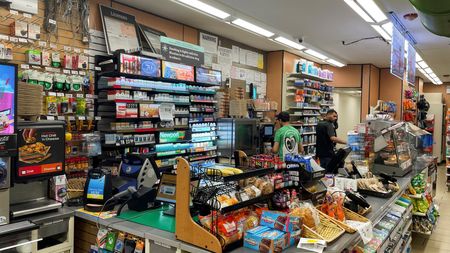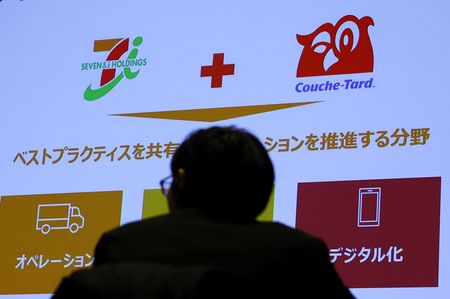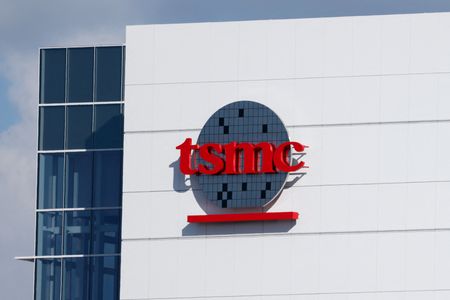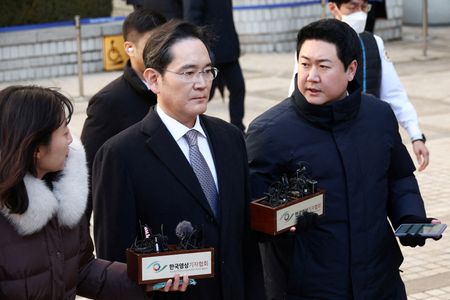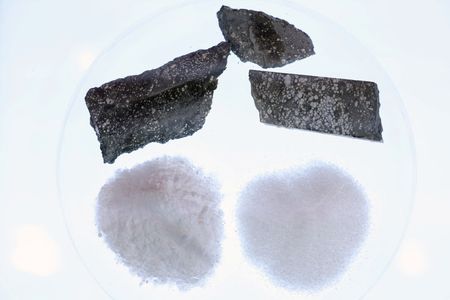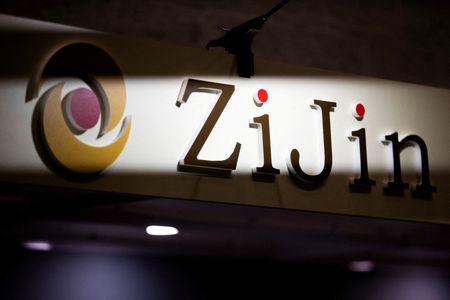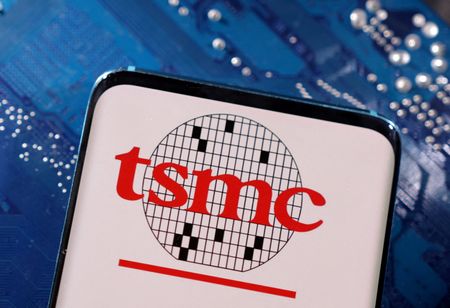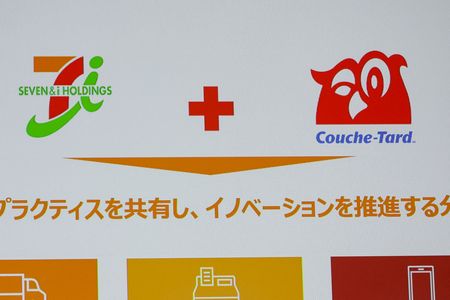TOKYO (Reuters) -Canada’s Alimentation Couche-Tard on Thursday pulled its $46 billion bid to buy Seven & i Holdings, saying the retailer refused to engage constructively on the deal, which would have been Japan’s largest ever foreign buyout.
Couche-Tard, which operates Circle K, spent a year trying to create a global convenience store giant by acquiring the company behind 7-Eleven.
The deal is the largest ever proposed corporate buyout to fall apart in the Asia Pacific region, according to Dealogic data.
Seven & i shares closed down 9% at 2007.5 yen, 23% below the 2600 yen offer price.
“There has been no sincere or constructive engagement from 7&i that would facilitate the advancement of any proposal, contrary to comments made publicly by 7&i representatives,” Couche-Tard said in a letter to the Japanese company’s board of directors.
“Rather, you have engaged in a calculated campaign of obfuscation and delay, to the great detriment of 7&i and its shareholders,” the letter said.
Seven & i said in a statement that “while we are disappointed by ACT’s decision, and disagree with their numerous mischaracterizations, we are not surprised.”
“It’s a ceasefire for now,” said independent retail analyst Akihito Nakai.
If Seven & i lists its North American business, that could be targeted by Couche-Tard, he said, adding, if it does not do so, Seven & i could again face a bid for the whole company.
Couche-Tard said their commitment to not pursuing a hostile takeover remains.
Seven & i is widely seen as a test case for corporate Japan’s openness to foreign takeovers. The withdrawal came after Nippon Steel was able to acquire U.S. Steel in a contentious $14.9 billion transaction.
“We are very disappointed in what appears to be a lack of willingness to engage from Seven & i,” said Manoj Jain, co-founder and co-CIO of Hong Kong-based Maso Capital, a Seven & i shareholder.
“We believe there is significant value to be realised in a combination and have expressed this view to the management and the board.”
Seven & i, whose first foreign CEO Stephen Dacus took the role in May, has been under intense pressure to improve its lacklustre earnings and demonstrate it can grow independently.
“We remain fully committed to our standalone value creation plan, which we have been pursuing in parallel,” said Seven & i.
PRESSURE FROM INVESTORS
Seven & i’s board is likely to face shareholder pressure to deliver that strategy as a standalone corporate entity. Some activist investors had urged the company to engage with its foreign buyer.
“No doubt minority investors are disappointed but the test will be to see what avenues they have to engage with the Seven & i board and management in the future on this issue,” Lorraine Tan, Director of Equity Research, Asia at Morningstar.
“I am quite skeptical that things will change. But my view is that at least on the positive side, it has sparked the management into being more proactive with a plan to boost shareholder value.”
Couche-Tard raised its offer to about $47 billion in October and in March offered to increase it further if the Japanese firm cooperated and revealed more financial information.
Based on Couche-Tard’s 2,600 yen per share offer price and the current exchange rate, the deal was valued at $46 billion.
The Canadian retailer was also working with Seven & i on a store sale plan, in a bid to ease some regulatory hurdles.
Its approach appeared to be gathering steam after a white-knight bid from Seven & i’s founding Ito family ended after failing to get financing.
Couche-Tard said it had sought to speak to the family but found them unwilling to engage.
The two companies inked a non-disclosure agreement (NDA) but “the quantity and substance of the permitted due diligence, including at two tightly constrained management meetings, have been negligible,” Couche-Tard said in the letter.
ALTERNATIVE PROPOSALS
Couche-Tard said it believed a full combination of the two companies would maximise value for shareholders but had also explored alternatives.
The retailer said it had proposed acquiring all of 7&i’s business outside of Japan and 40% of the business in Japan, where convenience stores are seen as key infrastructure due to their support role during natural disasters.
“We are not able to effectively pursue this combination without deeper and genuine further engagement from 7&i leadership and the special committee,” the letter said.
Seven & i proposed selling its international business to Couche-Tard in return for a stake in the Canadian retailer, the letter said.
Such a deal “would not deliver the significant premium that was offered to your shareholders in our transaction proposals,” the letter said.
(Reporting by Anton Bridge and Ritsuko Shimizu in Tokyo, Kane Wu in Hong Kong and Savyata Mishra in Bengaluru; Writing by Sam Nussey and Scott Murdoch; Editing by Shailesh Kuber and Sonali Paul)

